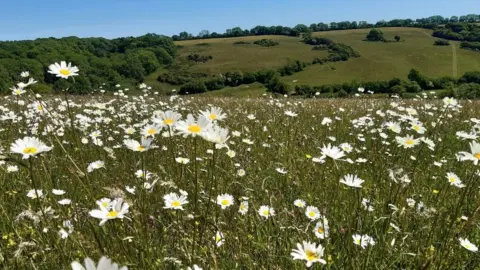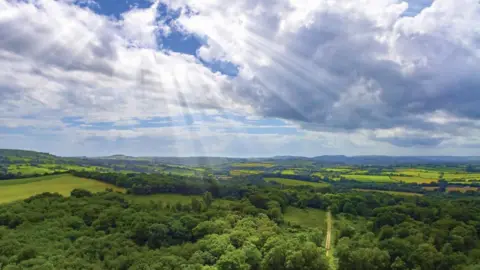Dorset farm designated National Nature Reserve
 Dorset Wildlife Trust
Dorset Wildlife TrustA farm bought by campaigners more than 30 years ago has been designated a National Nature Reserve (NNR).
Kingcombe Meadows in Dorset, along with neighbouring Powerstock Common, have been recognised as a nationally and internationally important landscapes.
Since being bought in 1987, the once run-down farm has been rejuvenated and the landscape has flourished, providing important habitats for native species.
Natural England said the reserves were the "jewels in nature's crown".
Kingcombe Farm, near Maiden Newton, was auctioned in lots following the death of its owner.
But following national publicity, campaigners and Dorset Wildlife Trust were able to raise funds to acquire several of the plots.
 Dorset Wildlife Trust
Dorset Wildlife TrustSince then the reserve has been expanded and the farm still operates as an organic, pesticide-free business.
The landscape of Kingcombe and Powerstock includes 309 hectares (764 acres) of grassland, woodland and scrub habitat, either side of the River Hooke and two Sites of Special Scientific Interest.
It is home to marsh fritillary butterflies, wildflowers - such as bee orchids - foraging bats and amphibians, with all three species of native newt breeding on site.
Dorset Wildlife Trust chief executive Brian Bleese said: "The designation of Kingcombe Meadows and Powerstock Common as Kingcombe National Nature Reserve is a wonderful tribute to the many people, staff and volunteers who had the vision to recognise the area for the special place that it is and have nurtured it for many years."
Natural England chair Tony Juniper said: "In some ways these reserves are akin to a battery pack that is injecting wild energy into the landscape, helping wildlife to recover, as we connect up and recreate wildlife-rich habitats."
There are more than 200 NNRs in England. The designation by Natural England recognises them as rare and precious areas for wildlife and geology.

Follow BBC South on Facebook, Twitter, or Instagram. Send your story ideas to [email protected].
